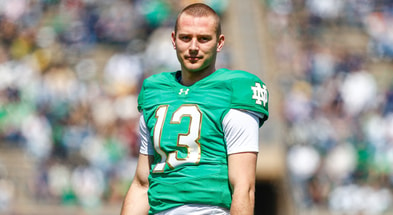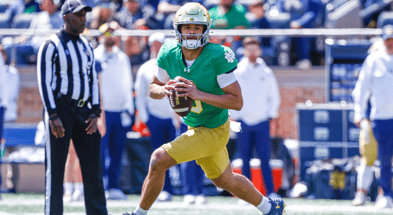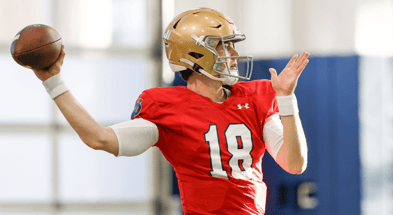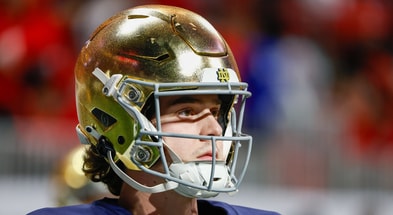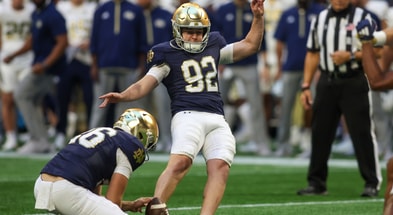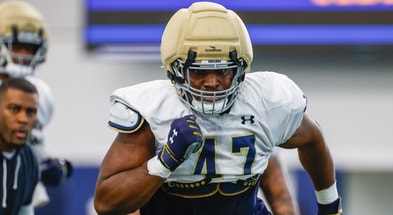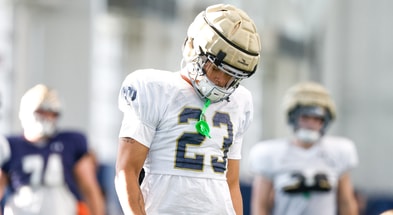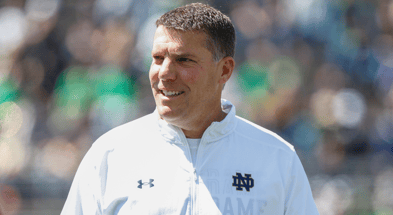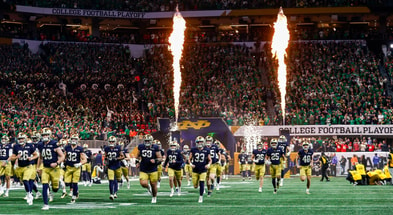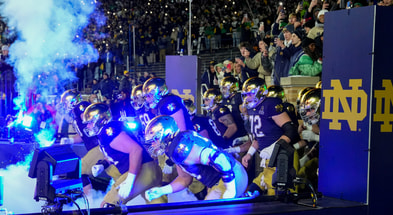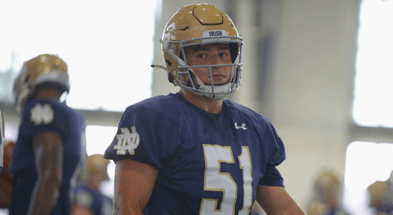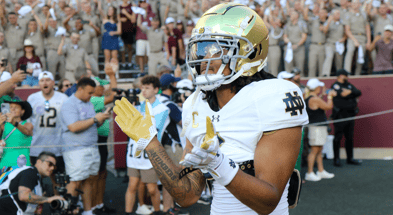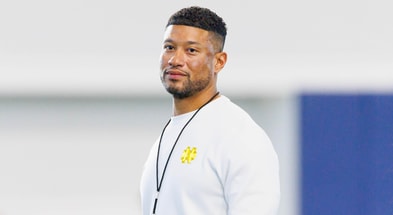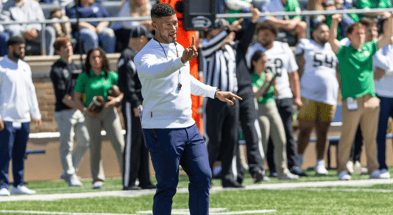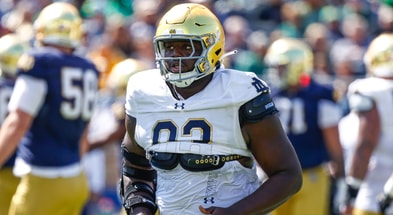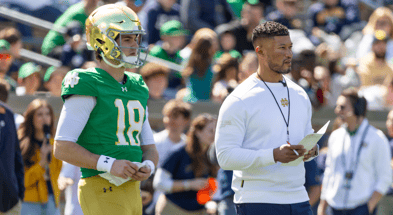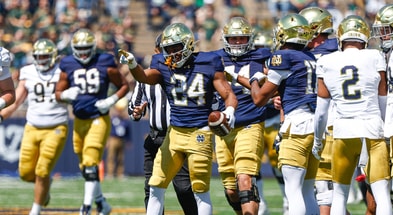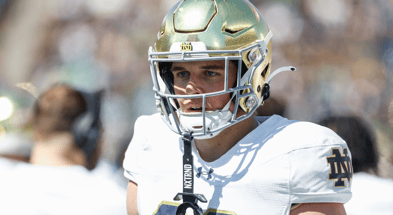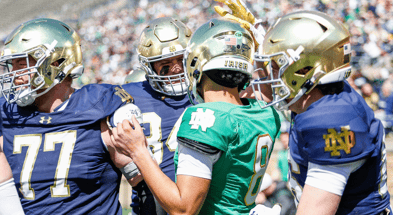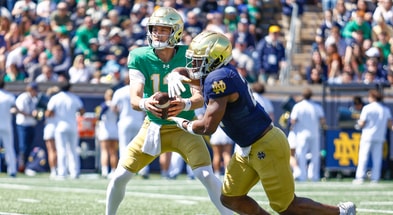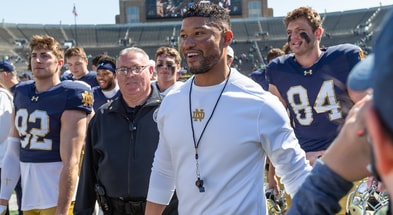Marcus Freeman transcript: Notre Dame head coach previews Sugar Bowl, talks Irish major bowl win drought, more

On Monday morning, Notre Dame head coach Marcus Freeman and dozens of Fighting Irish football players met with the media a couple days ahead of the Sugar Bowl against Georgia for the College Football Playoff quarterfinals.
Below is a transcript of what Freeman had to say.
Opening statement
“We’re excited to be here. It’s great to have all of our players here and our coaching staff. So we want the media to be able to get a chance to know our team. And after this, we’ll get back to work. So, with that, I’ll open up for questions.”
On RB Aneyas Williams’ usage against Indiana and if it’ll be similar against Georgia
“I think all of our backs provide different skill sets, and we use them in different ways, and Aneyas is a guy that has progressed all season long and has really done a great job of earning the trust that we demand from your coaches and players. And he’s a guy that can be in there a lot more. We’ve just got a lot of running backs that are able to help this offense be productive.
“And so I see him continuing to elevate his role, continuing to be a big part of what we’re doing offensively, and look forward to seeing what he does on Wednesday.”
On luring Mike Denbrock from LSU and if there’s a ‘culture gap’ between him and his coordinators due to age difference
“There might be a gap in terms of maybe our fashion sense or — the ages of our kids are close. But there’s a lot of wisdom there. There’s a lot of wisdom with those coordinators and all of our coaches that I’m able to utilize to help myself.
“But with hiring Coach Denbrock, obviously, we’ve had a pass together for four years when we were at Cincinnati. He was the offensive coordinator, I was the defensive coordinator. And I knew during those times what type of coach, but person, he is. And when I had a chance to hire an offensive coordinator last year, he was the number one person I was going to go after. I didn’t know if he would say yes or no.
“And ultimately, he made the decision to come back; and he made it because it was what’s best for him and his family. It wasn’t the opportunity to work for me, work with me. It was the opportunity for him and his family being able to come back to South Bend, and that’s what was best for them.
“So we’re extremely grateful. I’m extremely grateful to have him leading our offense. And there is a comfort knowing that our offensive coordinator is Mike Denbrock.”
On preparing for Georgia QB Gunner Stockton without much film on him
“Well, I think you utilize the game film that’s there. There’s 80-something plays of him playing this year, and [he’s] doing a really good job at running their offense. I don’t think they’re going to change their offense completely because of who’s at quarterback.
“He does a lot of things well that Carson Beck did well. He can throw it. Carson Beck is more athletic than I thought — until I started watching the film. He can do a lot of really good things, and he makes great decisions in those 86 plays that we watched him.
“So, I don’t assume it’s going to be that much different, but it’s also a game of adjustments. We have to be able to see what they’re trying to do and their plan of attack versus our defense and be able to adjust, and that’s what the game of football has been all year.”
On if he finds Georgia ‘stylistically similar’ to Notre Dame
“There are some parallels. They’re an offense that believes in running the football, and that’s what we believe in and our offensive philosophy. We have to be able to run the football. That creates a lot of openings in the pass game. And although we might throw for more yards than we do the run sometimes, it doesn’t matter. It’s a philosophy of being able to run the football.
“And I think Georgia has a similar mindset. They’ve got big old linemen that are tough, that can drive you off the ball. Do a really good job of trying to take advantage of what you are giving them defensively.
“Those are similar things that we do. We want to get the ball to our playmakers in space, no matter who those playmakers are, and let them make plays. And so I think there is some overall general philosophy similarities between the two offenses; but obviously, there’s some differences, too.”
On if he believes college football needs a ‘commissioner-type person’ to lead the sport
“Yeah, I think there’s always a need for leadership, what the organization is, how do we continue to enhance it.
“I don’t know if there’s just one answer for how you make college football better. I think it’s a collective group of individuals and thoughts and a commissioner. And there’s a lot of different things that I think could really go into the equation to enhancing our sport.
“I think everybody wants it to improve, but we also have to have empathy for all different sides. We have to have the understanding of the demands of our young people academically, NIL-wise, socially, all the different demands they have on them. And also understanding the expectations we have as a football program and the football programs across the country.
“So, I don’t believe there’s just one answer to truly fix or enhance college football and college athletics. But I do believe we’re progressing. I believe every year you’re seeing enhancements and decisions made that I think everybody has the mindset of how do we make this thing better, and I foresee it continuing to improve.
“I don’t ever want the headline to be that Marcus Freeman said, ‘This is what you need to do to make college football right.’ There is no one right answer. There’s a collective group of thoughts and people that are continuously investing into this sport and trying to find a way to continue to make it better for our young people.”
On the challenge of stopping Georgia RB Trevor Etienne and the Bulldogs’ RB usage
“He is a really explosive, very good football player. If you give him space, he’s going to take it, and he’s got the ability to take it the entire way. So he’s a challenge, and he’s a challenge in the run game, but also in the pass game.
“And so we have to know where all their backs are at all times. They utilize their backs in really unique ways, and it’s not just one guy. I think Etienne is extremely talented. He does a lot of things well, but they’ve got a stable of backs that present challenges.
“We have to know where they’re at, we have to know where they’re aligned, and really have a great plan for their running back situation.”
On what Rylie Mills meant to the Notre Dame football team
“No. 1, he’s a captain. He’s a captain. He’s a leader. That’s the one thing that hurts you. You can’t replace a captain, and you can’t replace his leadership. You have to try to replace the production with multiple different people, ways, schemes, schematic things.
“It’s not going to be just one person that’s going in there to replace Rylie Mills. You feel terribly for him as an individual. He came back to really lead this program to the position it’s at, to improve his draft stock. And I believe in my heart that he improved his draft stock, and he’s led this team to a great position. But now we have to be able to replace his production with capable guys that we have in this program.
“We’ve got some guys that have played a lot of ball behind Rylie that will step up to the challenge and I believe will do great things.”
On balancing Riley Leonard’s usage to keep him from getting injured
“Yeah, we know the ability that Riley [Leonard] has to run the football. It’s something that helps our offense. It’s not always a designed quarterback run. It’s sometimes his decision to take off and make a play with his legs.
“As the head coach, you hate to see your quarterback get hit, but it’s a part of the game. And it’s what makes him unique and special and productive for our offense.
“I don’t want to take that away from him. We have to utilize what he does well but also understand that he’s our quarterback and we’ve got to protect him.
“There’s a fine line of how much he runs versus how much we design QB runs versus, hey, stay in the pocket and throw the ball. We have to utilize all three different areas in our offense, and that will be a part of our plan coming up.”
On Georgia’s identity on both sides of the ball
“You can tell they’re a physical, aggressive, attack in mindset. They’re big on the offensive line. They run the ball. They’ve got some good backs. And again, they can throw the ball, too.
They’ve got some skill that presents challenges. Defensively, again, they’re big up front. They’ve got multiple backers, like they do running backs, that make plays, that are difference-makers. And they’ve got good skills.
“So, really balanced team. I think when you say, what’s their identity, I know what I see is a physical, sound team that plays with velocity, and it’s something we often talk about in our program, is that at the end of the day, it’s not going to be about tricking your opponent. It’s going to be about playing with velocity, which equals violence and some other physical attacking words.
“It’s a really good football program.”
On if he’d like to see more home field playoff games
“I thought the first round of playoffs was amazing, to have a home playoff game and multiple — I think four of them around the country. It was amazing. It really was. But you don’t want to take away from the history that makes college football special in these bowl games. The Sugar Bowl, I think, is the second-longest bowl in all of the bowls, right?
“And I grew up watching the Nokia Sugar Bowl, which is now obviously the Allstate Sugar Bowl, and the Rose Bowl, and some of these famous bowl games.
“I think it’s awesome that we’re able to have these home playoff games in the first round, and you still keep the tradition and the history of these bowl games as you go into Quarterfinals and the Semifinals and the finals. I think it’s a great mixture.
“I think they got the formula right in terms of the location and being able to play that first round at home or on a college campus and then still keeping intact the history and tradition of our bowl games.”
On crossover between the Georgia team he coached against a few year ago at Cincinnati compared to now
“I don’t know. I mean, is there some similarities in terms of the defense? There might be, because the coordinator now was on staff there, and obviously Kirby Smart was the head coach.
“The personnel, it was elite then, it’s elite now, right? The way they play the game with physicality and running the ball and stopping the run, it was the same then as it is now.
“But the personnel is different. The quarterback was different. The guy back then was the Daniels kid, JT Daniels. I remember [George] Pickens was the wide-out, and they had the big No. 0 (Darnell Washington) was the tight end.
“I mean, I could go on and on about some of those guys, but schematically, we do things differently here under Coach [Al] Golden and our defense than we did when I was the defensive coordinator.
“So it’s a game you reference. At least you know, okay, hey, this is a Georgia team that you faced when you were at Cincinnati. But I think this team at Notre Dame and this current Georgia team are different programs, yeah.”
On the transfer portal window being open during playoff run
“Yeah, it’s difficult. It’s difficult. I’ve always been a guy to just say, hey, how do we do the best we can within the rules of the game? And there’s a lot of people that put a lot of time and effort into creating these rules and timelines and guidelines. I don’t. I try to say let’s maximize the opportunities that we have.
“And so, yes, there’s difficulties to it; but there’s not — me complaining about it isn’t helping. Let them figure out what’s best. There’s always a better way. There’s always a better way there’s always a better way no matter when you put the transfer portal window. There’s a lot of different opinions about it.
“We’ve just got to make sure we maximize every year what’s best for this program within the rules of the calendar that have already been set.”
On how the team has changed since the Northern Illinois game
“Yeah, I think it’s a constant improvement. There was some issues and mistakes that we made in week one versus A&M that were probably masked to the outside by the outcome of the game. And they were obviously magnified the following week because of the outcome of the game.
“And what we have to do is continuously improve. I think there was some valuable lessons that the loss to NIU taught us, but it’s this constant chase for improvement, every week, every day, that we have been able to make, and we still continue to have that mindset.
“So how different is this team now? It is different because we’ve improved. No matter where you’re at, no matter what the outcome of the last game was, it’s a mindset of constant improvement. And I know we’re a much-improved team now than we were back then.”
On recruiting smart football players and not just blue-chip players
“I think we want the perfect football player. Everybody wants the most athletic, the most intelligent, the most motivated, the most competitive football player you can find.
“We’ve got to make sure that we find guys that fit Notre Dame in terms of what we’re looking for athletically, but also there’s requirements that it takes to get into school.
“They’ve got to embrace what this place truly entails. It’s not a big school. It’s about 8,500 kids in South Bend, Indiana. It’s going to have some cold winters. But we say to the guys in this room ‘choose hard.’
“That’s the one thing we talk about all the time. You’ve got to choose hard, and these guys have chosen hard, and they’ve got to choose hard every day.
“And so I don’t think we go and we look for GPAs to say ‘that’s a smart kid,’ let’s go bring them in to Notre Dame. No, we go out and we evaluate your film. We talk to your coaches. We talk to the kids. We talk to the parents and say, Okay, is this a person that’s going to thrive at this place?
“And a lot of these kids are extremely intelligent, they are. It’s a difficult school. It’s a challenging school, a challenging education; but they’re great football players, too.”
On the culture within the football team
“I think it’s trying to fight being normal every day, and we embrace that. I want our guys to embrace that and to want that.
Top 10
- 1New
FSU Shooter
Police identify shooter
- 2Hot
Carson Beck
Talks trash to Miami OC
- 3
Tampering accusation
Deion Sanders calls out UVA
- 4Trending
Chad Baker-Mazara
Auburn star entering portal
- 5
Deion Sanders jab
CU coach blasts NCAA
Get the On3 Top 10 to your inbox every morning
By clicking "Subscribe to Newsletter", I agree to On3's Privacy Notice, Terms, and use of my personal information described therein.
“I think it’s normal for the normal person to wake up and just go in and say, ‘Let’s get my job done and go home.’ And I want our guys to be misfits and to find a way to push yourself outside your comfort zone every single day — to look for hard and to run the hard and to choose hard every single day.
“I think that’s the mindset we as a program have to have. I want misfits. We want to be misfits. We don’t want people to look at us and go, ‘Oh, yeah, you’re just a normal coach, you’re a normal football player.’
“We want to be a little bit of a misfit and embrace that and do the things that misfits do. And that’s not just one thing, one example. If everybody’s doing something, you want to probably try to do something harder, do something different. That’s kind of that misfit mentality that I believe we’ve got to keep and we’ve got to be.”
On Notre Dame’s major bowl drought
“Yeah, I don’t know what’s considered a major bowl, you know? If you would have said two guys that their dad was on the last national championship team, I would say, Oh, yeah. But every bowl has got to be a major bowl. You’ve got an opportunity to go out and compete and win. If you’re waiting to be in the Sugar Bowl to consider it a major bowl, then you’re not the competitor we need you to be.
“This is an opportunity for us to go and compete against one of the best teams in the country in the Allstate Sugar Bowl. It’s a privilege. We’re grateful for the opportunity, and we’re going to prepare in a way that’s going to give this program the best chance to do that.
“But I don’t believe much in a ‘major bowl.’ I believe in the opportunity to go out there and compete and win with guys that prepare like heck with you. And so that’s the mindset we’ve got to have.
“But I think you’ve got to be grateful for this opportunity, because that will reflect in terms of how you prepare.”
On recruiting multi-sport athletes
“I don’t know if we say, ‘Let’s go target all the multi-sport high school athletes,’ but I do love when I hear the guys we’re targeting play more than just football. There’s a competitive side of things that just training doesn’t give, it doesn’t provide. And I love to hear about multi-sport athletes.
“I love guys that run track. I love guys that play basketball and lacrosse and different sports because it just shows that they’re not in the offseason just looking to specialize in football. They’re willing to go out there and compete.
“And what I really love about it is sometimes they’re not as good in the other sports as they are in football, and so they’re willing to put their ego aside and say, ‘I know I might lose in track, but I’m going to try to make myself better as an athlete.’ And that speaks volumes to me.
“Now, as you look at some of our guys, [Jordan] Faison was a lacrosse recruit and signee first. And then we were able to say, “Hey, this guy can watch football, let’s watch his film.” And then all of a sudden he got in fall camp and he was better in-person than we ever even thought.
“We got a kid named Matt Jeffery who is one of the top, if not the top, lacrosse player in the country last year. And we said, “Man, this is a very similar situation to Jordan Faison. “We’ve already got the example right in front of us, and he’s been a huge addition to our program.
“It’s something that’s hard to balance for those guys, to be a full-time football player and, during the spring, be a full-time lacrosse player. It’s a lot of load in terms of the physical load on their body. But we’ve got a great sports performance team that’s able to balance both of them.
“And if it’s an opportunity for us to attract the right kids that can help us in our football program and play lacrosse, play baseball — got a couple kids that play baseball — that’s what we’re going to do. I think it’s something that we can start to sell now that makes us unique and different.”
On how Al Golden has helped the program
“The enhancements that we’ve made from year one to year three with him leading our defense has been tremendous. The knowledge that he provides, the teaching that our young people are able to learn has been tremendous. The addition to our coaching staff, the wisdom he’s able to provide to our coaching staff, and the part of our — the piece of our coaching staff that he is, it’s been tremendous. The knowledge that he has a former head coach, I can go on and on.
“I’ve utilized some of his experience in terms of being a head coach, asked him what he’s done. There’s a lot of different things I could say that he’s provided to this program, but I don’t know if there’s just one thing that’s more important than another.”
On his first job in football being at Ohio State as a grad assistant
“I played college at Ohio State. And then when I found out I had an enlarged heart valve — I was in the NFL and they found an enlarged heart valve. I called Coach [Jim] Tressel, who was my college coach, and I said, ‘Coach, I want to get into coaching.” And there was an opportunity to go to Ohio State and be a GA. I wasn’t looking to just say, Coach, hire me at Ohio State. It was just, ‘Coach, I need your wisdom, I’m looking to get into coaching.’
“And there happened to just be an opportunity available at Ohio State. I think I started off actually as like a quality control and moved into the GA role sometime during that first year, but that’s kind of how that happened.”
On the new roster limits coming up and how he’s going to figure that out for his team
“Yeah. I mean, nothing’s for certain yet. There’s a vote coming up in the new year that will determine if those roster limits are put in place.
“We have a plan for both. We have a plan for if the roster limits are put in place. We have a plan for if there’s some type of phase-in, which some people have talked about being a phase-in. And then we have a plan if there’s not going to be roster limits in place.
“So you can’t wait until the final decision happens to come up with a plan. We have plans for all three, but we don’t need to move on anything until a final decision is made.”
On recruiting Jerome Bettis Jr. to Notre Dame
“We say blood is thicker than water, right? His daddy wore a gold helmet, and we were somehow, some way able to convince him this was the right opportunity for him. But I think his dad wearing the gold helmet had a factor; but, also, he knows he’s going to create his own path. He’s a great player, going to do some great things.
On Notre Dame’s confidence as a team
“Confidence sometimes is fueled by execution and success. And I think there’s a fine line between how do you get them to be confident when they’re not having the outcomes they want in terms of how do you continue to get them to be confident, and you’re having somebody the success you aspire to have.
“I think early in the season, there was a choice that you had to make to be confident, and you had to make a choice. Be confident. Quarterback, be confident. I don’t care what happened last play or last game, be confident.
“I think now, when you talk about in week — what are we, 14 now, that you can show them some of their previous successes and say, hey, have confidence. Look how good you are and look how good you can be.
“And so I think it is a fine line. It’s psychology to try to get them to be confident, not overly confident, to be humble enough to put the work that you have to put in to give yourself the chance to have success.
“That’s imporatnt. I want them to be confident. But sometimes if you’re overly confident, you don’t put the work in that humble people must do. And that’s why you often hear me say “keep the pain,” because we’ve got to remember, we’ve got to be those desperate individuals that we were after that loss. We’ve got to be that same desperate individual now in terms of the preparation that we put into this week as we get ready for this game.”
On messaging to the team after the NIU loss
“I don’t believe in after that loss to Northern Illinois to jump on them and point fingers. They feel just as bad as you as the head coach. In those moments, I think it’s important to look at yourself and put blame on yourself.
“I don’t want them to worry about pleasing me in that moment. I want every person in this program, every coach to look at themselves in that moment. You’ve heard me say this before, when you don’t get the outcome you want, it’s an individual sport. And that’s what I want them to do after Northern Illinois, look at yourself.
“After having success, that’s when you’ve got to have a team sport. That’s when you’ve got to be able to go outside of your comfort zone, be a pleaser. Why? Because it’s a team sport. The guy next to you needs you to do it.
“And so that’s the psychology of this whole thing, is that — not after Northern Illinois, it’s after Louisville or after — I don’t know, after Army or Navy, one of those undefeated wins. We need them to be pleasers, because that’s when complacency will set in. Hey, let’s just keep doing what we’ve always done.
“And every week, I’m telling them to elevate. I ask them to elevate before we played Indiana. And then I go back in there the first day that we get ready for Georgia and say, “All right, we’ve got to do more.
“We’ve got to enhance what we do. And if they put others in front of themselves, especially after success, then you’re willing to do that. If you’re just — if it’s an individual sport at those times, it’s like, ‘Coach, I’m doing everything I need to do,’ right?
“And so I think it’s all in the psychology of being able to push them at the right times but in the lowest moments. We’re in this together. Hold on. This is on me, just as much as it’s on anybody in this room.”
On one thing he wants to see from his team Wednesday
“Velocity … It’s playing with velocity for 60-plus minutes. And in order to do that, you have to have clarity in terms of what you’re being asked to do. And that’s going to be important in these last 48 hours, to gain as much clarity as we can so then you’re not thinking.
“I told them yesterday, if you wait until you know to make a decision, it’s going to be too late, and you’re not playing with much velocity then. And so we’ve got to continue to prepare in these last 48 hours to gain as much clarity as we can. And listen, when the ball snaps, let’s go play with velocity, man. Go play with speed, go play to make plays, and win this play. I know that’s coaching talk, but win this play. Win this play with velocity on Wednesday.”

